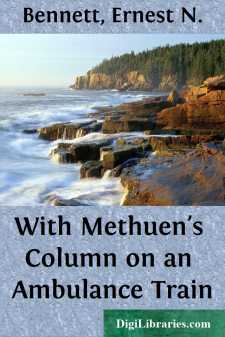Categories
- Antiques & Collectibles 13
- Architecture 36
- Art 48
- Bibles 22
- Biography & Autobiography 813
- Body, Mind & Spirit 138
- Business & Economics 28
- Children's Books 12
- Children's Fiction 9
- Computers 4
- Cooking 94
- Crafts & Hobbies 4
- Drama 346
- Education 46
- Family & Relationships 57
- Fiction 11821
- Games 19
- Gardening 17
- Health & Fitness 34
- History 1377
- House & Home 1
- Humor 147
- Juvenile Fiction 1873
- Juvenile Nonfiction 202
- Language Arts & Disciplines 88
- Law 16
- Literary Collections 686
- Literary Criticism 179
- Mathematics 13
- Medical 41
- Music 40
- Nature 179
- Non-Classifiable 1768
- Performing Arts 7
- Periodicals 1453
- Philosophy 64
- Photography 2
- Poetry 896
- Political Science 203
- Psychology 42
- Reference 154
- Religion 505
- Science 126
- Self-Help 81
- Social Science 81
- Sports & Recreation 34
- Study Aids 3
- Technology & Engineering 59
- Transportation 23
- Travel 463
- True Crime 29
With Methuen's Column on an Ambulance Train
Description:
Excerpt
WITH METHUEN'S COLUMN ON AN AMBULANCE TRAIN.
The first view of Capetown from the sea is not easily forgotten. We sailed into the bay just as the sun was rising in splendour behind the cliffs of Table Mountain. The houses of the town which fill the space between the hills and the sea were still more or less in shadow, picked out here and there by twinkling lights. On the summit rested a fleecy cloud which concealed the pointed crags and hung from the edges of the precipice like a border of fine drapery. On the right, groups of buildings stretched onwards to Sea Point, where the surf was breaking on the rocks within a few feet of the road; on the left were the more picturesque suburbs of Rosebank, Newlands and Claremont nestling amid their woods and orchards; and still further on lay Wynberg, with its vast hospital, already become a household word in English homes. The dreary flats of Simon's Bay, where British war-ships lay at anchor, shut in the view.
Pleasing as the picture is when seen from the deck of a Castle Liner, disappointment generally overtakes the voyager who has landed. Capetown itself has little to boast of in the way of architecture. Except Adderley Street, which is adorned by the massive buildings of the Post Office and Standard Bank, the thoroughfares of the town offer scarcely any attractions. The Dutch are not an artistic race, and the fact that natives here live not in "locations" but anywhere they choose has covered some portions of the town's area with ugly and squalid houses. Nor, as a matter of fact, does the general tone of thought and feeling in Cape Colony naturally lend itself to aesthetic considerations. Even the churches fail to escape the influence of a spirit which subordinates everything else to practical and utilitarian considerations. Can two uglier buildings of their kind be found in the civilised world than the English and Dutch cathedrals at Capetown?
Another unpleasant feature of life in Capetown is the misfortune, not the fault, of the inhabitants in being frequently exposed to the full fury of the south-east wind. Sometimes for whole days together the Cape is swept by tremendous blasts, which tear up the sea into white foam and raise clouds of blinding dust along the streets of the town.
Nevertheless the kindness and generosity of the people are not in any way lessened by these unpleasant features in their surroundings. The warmth of colonial hospitality is acknowledged by all travellers, and may be partly due to that love of the mother country which survives in the hearts of Englishmen who have never left South Africa, and yet recognise in the visitor a kind of tie, as it were, between themselves and old England. Such hospitality blesses him that gives as well as him that takes, and the host listens with deepest interest to his guest's chatter about London, or perhaps the country town or village where he or his forefathers lived in days gone by. Any one who is accustomed in England to the conventional "Saturday to Monday" or the "shooting week" in a country house opens his eyes with wonder when he receives a warm invitation from a colonial to spend a month with him at his house on the Karroo. And such invitations, unlike those which the Oriental traveller receives, are uttered in earnest and meant to be accepted.
Capetown is by far the most cosmopolitan of all our colonial capitals. Englishmen, Dutchmen, Jews, Kaffirs, "Cape boys" and Malays bustle about the streets conversing in five or six different languages. There is a delightful freedom from conventionalism in the matter of dress. At one moment you meet a man in a black or white silk hat, at another a grinning Kaffir bears down upon you with the costume of a scarecrow; you next pass a couple of dignified Malays with long silken robes and the inevitable tarbush, volubly chattering in Dutch or even Arabic....


